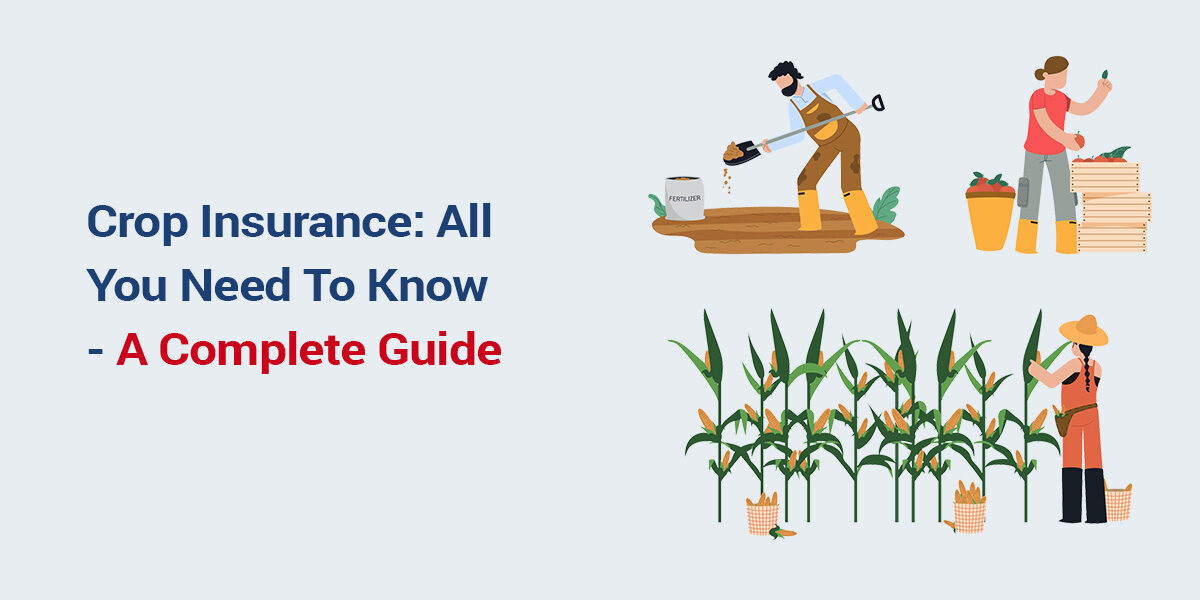Table of Contents
Crop Insurance – Overview
Usually crop production is affected adversely due to unfavourable weather conditions and attack of pests and diseases. In order to protect the farmers against these uncertainties during farming, a mechanism called crop insurance is put in place. It safeguards the agriculture producers from damages due to unforeseen and natural factors which are beyond their control.
Types of Crop Insurance
The crop insurance business comes from ‘schemes’ which are implemented on the principle of ‘area approach’, which means defined areas for each notified crop for widespread calamities. Insurance coverage is mandatory for farmers taking crop loans from rural financial institutions (RFIs) for cultivation of crops. Other farmers can also insure their crops under the same schemes.
There are three types of crop insurance:
1. Multiple Peril Crop Insurance:
Multi-peril crop insurance (MPCI) is structured in a way so as to protect the farmers from losses in crop production, including lower yields, caused by natural calamities or events like disease (pest and insect damage), drought, flooding, fire or destructive weather. The MPCI is purchased before the crop is planted.
2. Actual Production History
The actual production history (APH) of farmers or agricultural producers is taken into account to analyse the grower’s actual yields over a period of time. Based on the APH, the farmer or agricultural producer is offered a lower or higher premium for their crop insurance.
3. Crop Revenue Coverage:
Farmers income can be largely affected due to extremely variable crop prices. Farmers can opt for crop revenue insurance coverage to protect their earnings in case they have a low yield or the price drops.
Crop Insurance: Eligibility Criteria
Crop Insurance is compulsory for farmers who are availing crop loans from rural financial institutions (RFIs) for cultivation of their crops. They are also called as ‘loanee farmers’. Other farmers, also known as ‘non-loanee farmers’ have an option to insure their crops under the same schemes.
Crop Insurance: What Does It Cover?
Crop Insurance covers losses due to natural events, destructive weather, disease or pests and / or the income loss due to drastic price drop of agricultural commodities. Some examples of these adverse events are:
- Adverse weather conditions
- Fire
- Insects
- Plant disease
- Wildlife
- Earthquake
- Volcanic eruption
- Failure of the irrigation water supply, if applicable, due to an unavoidable cause of loss occurring within the insurance period.
Crop Insurance: How Does It Work?
Crop Insurance is also known as Agriculture Insurance. The crop insurance is purchased by agricultural producers including farmers in order to mitigate the risks of crop losses, lower yields, price drop, etc due to natural events and disasters like floods, drought, etc. Crop insurance is provided by a provider who is paid a premium either by the producer themselves, or by the government or partly paid by the producer and by the government in the form of subsidy.
Crop Insurance Claim Process
Loanee farmers, that is farmers who have taken crop loans from rural financial institutions are enrolled by the bank. Non-loanee farmers can be enrolled by the banks, broker, CSC e-Governance Services or directly through website.
- Fill up application form of scheme
- Submit to nearest bank branch or CSC or authorised channel partner or insurance intermediary of the insurer.
- After verifying documents, bank branch may accept or reject the application
- It is responsibility of bank branch to complete the application process of eligible farmers
- Bank accepts premium preferably from farmer’s operational account
- In case application is submitted through CSCs, farmers will be required to authenticate herself/himself using Aadhaar for filling up online application form
- CSC will verify and upload all requisite/desired supporting documents on portal while filling up the application form on behalf of the farmer.
- Insurance company or its designated agents verify insurable interest and collect the land records, Aadhaar Number, particulars of acreage, sum insured, crop sown etc. and applicable contract/agreement details in case of share croppers/ tenant farmers
Crop Insurance: Documents Required for Claim Process
The non-loanee farmers are required to submit necessary documentary evidence of land records prevailing in the State.
- Duly completed claim form
- Records of Right or Land Registration Papers/Land Patta number
- Land possession Certificate or ownership documents
- Aadhar Card
- Personal Identification Proof like ration card, PAN Card, and/or voter card
- Bank Account Details
- Sowing Declaration
- Claim Reimbursement Form or the Application Form
- Applicable contract/ agreement details/ other documents notified/ permitted by concerned state governments in case of sharecroppers/tenant farmers.
Crop Insurance: Time Taken to Settle Claims
A farmer is eligible to get compensation for the crop loss in the following circumstances under which the claim is triggered. Usually the farmer needs to inform the insurance company within 72 hours of the localised calamity or post-harvest losses and in case of a widespread calamity the farmer gets the compensation at the end of the season
- In case of widespread calamities, the state government provides the crop yield data. On the basis of this data, the insurance company works out the losses suffered and compares it with the threshold yield. If the crop yield is less than the threshold, the insurer pays the loss amount to the farmers at the end of season or within 21 days of the crop yield data shared by the state government, whichever is later.
- In case of local calamity or post-harvest losses the farmers are needed to intimate the insurance company within 72 hours of the event occurrence. This can be done through banks, tehsil agriculture offices or directly to insurance company.
- The insurer appoints a surveyor to assess the crop loss and settles the claims within 15 days of intimation, provided the subsidy has been paid by the State as well as Central Govt.
Crop Insurance: Renewal Process
It is the responsibility of the farmer or agricultural producer to renew their crop insurance. They can do the renewal process by visiting the bank, broker, CSC e-Governance Services or directly through website.
Crop Insurance: Benefits for Farmers
Financial stability of agricultural producers or farmers is critical for the economic growth of the country. If farmers are protected against losses and damages to their produce, they will not fall in the trap of private lenders offering loans at higher interest rates. Farmers will be able to repay their loans with the support of insurance partners.
Here are a few benefits of crop insurance for farmers:
- Financial Stability: Farmers can become financially stable as they are protected against the losses caused by crop failure and damage due to natural events.
- Technological Awareness: Insurers also engage with technological platforms and companies to enhance the agriculture practices of the farmers. This creates awareness amongst the farmers and in turn enable them to understand the advanced technologies to improve their crop production.
- Tax Exemption: Farmers can avail tax exemption on the premium paid by them against the crop insurance.
- Yield Protection: Crop insurance also offers preventive planting and replant security to farmers
Crop Insurance: List of Companies In India
- Agriculture Insurance Company (New Delhi)
- Bajaj Allianz General Insurance Co. Ltd (Pune)
- Bharti AXA General Insurance Company Ltd (New Delhi)
- Cholamandalam MS General Insurance Company Limited (Chennai)
- Future Generali India Insurance Co. Ltd (Mumbai)
- HDFC ERGO General Insurance Co. Ltd. (Mumbai)
- ICICI Lombard General Insurance Co. Ltd (Mumbai)
- IFFCO Tokio General Insurance Co. Ltd (Gurgaon)
- National Insurance Company Limited (Kolkata)
- New India Assurance Company (Mumbai)
- Oriental Insurance (New Delhi)
- Reliance General Insurance Co. Ltd (Mumbai)
- Royal Sundaram General Insurance Co. Limited (Chennai)
- SBI General Insurance (Mumbai)
- Shriram General Insurance Co. Ltd (Jaipur)
- TATA AIG General Insurance Co. Ltd (Mumbai)
- United India Insurance Co (Chennai)
- Universal Sompo General Insurance Company (Mumbai)
What Does A Crop Insurance Broker Do?
Crop Insurance Broker provides information about the insurance product and premium to the farmers (insured) and advises them to purchase it. The insurance policy information varies across states and crops. The brokers also collect information required for the policy from the insured. The brokers receive a commission or fee for their services.
What is Pradhan Mantri Fasal Bima Yojna?
Pradhan Mantri Fasal Bima Yojana (PMFBY) is scheme for supporting sustainable production in agriculture sector. It aims to do so by providing financial support to farmers, encourage farmers to adopt modern practices and ensuring flow to credit to the agricultural sector.
Click here to know more about Pradhan Mantri Fasal Bima Yojana (PMFBY)
Crop Insurance: FAQs
Q1: Why Government provides crop insurance to the farmers?
Government provides crop insurance to farmers to provide financial support to them in the event of crop failure. It helps farmers secure their income and adopt modern agricultural practices.
Q2: Is crop insurance tax deductible?
One of the benefits of crop insurance is the tax exemption on premium paid by farmers for the crop insurance policy.
Q3: Does crop insurance cover drought?
Yes. Crop Insurance covers natural events like drought.
Q4: Does crop insurance cover flooding?
Yes. Crop insurance covers natural events like flooding.
Q5: Does crop insurance cover wind damage?
Yes. Crop Insurance covers wind damages to the produce.
Q6. What is crop insurance proceeds?
Crop insurance proceeds are the benefit proceeds paid out by the insurance policy as a result of a claim. The crop insurance proceeds are paid to the insured (farmer) after the claim is verified by the insurer (insurance company).
Q7: Is crop insurance subsidized?
Yes. Crop insurance can be subsidised by the government through various schemes. A farmer or an agricultural producer can also pay the full premium amount in case no subsidised insurance policy is offered.
Q8: Is crop insurance mandatory?
Crop Insurance is mandatory for farmers availing crop loans from rural financial institutions. Other farmers can also purchase crop insurance voluntarily.
Looking for a Crop Insurance Broker?
Since crop insurance schemes can vary across states and crops, it is important to have a qualified and trusted broker to look after your crop insurance needs. The broker should understand the agricultural practices and situation in your area and also the suitable offerings from different policies. If you are looking for such qualified and trusted crop insurance broker, do visit our website.




